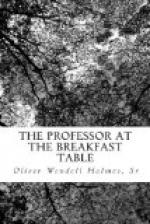The divinity-student could not deny that this was what might be called opening the subject to the discussion of intelligent people.
But,—he said,—the greatest objection is this, that persons who have not made a professional study of theology are not competent to speak on such subjects. Suppose a minister were to undertake to express opinions on medical subjects, for instance, would you not think he was going beyond his province?
I laughed,—for I remembered John Wesley’s “sulphur and supplication,” and so many other cases where ministers had meddled with medicine,—sometimes well and sometimes ill, but, as a general rule, with a tremendous lurch to quackery, owing to their very loose way of admitting evidence,—that I could not help being amused.
I beg your pardon,—I said,—I do not wish to be impolite, but I was thinking of their certificates to patent medicines. Let us look at this matter.
If a minister had attended lectures on the theory and practice of medicine, delivered by those who had studied it most deeply, for thirty or forty years, at the rate of from fifty to one hundred a year,—if he had been constantly reading and hearing read the most approved text-books on the subject,—if he had seen medicine actually practised according to different methods, daily, for the same length of time,—I should think, that if a person of average understanding, he was entitled to express an opinion on the subject of medicine, or else that his instructors were a set of ignorant and incompetent charlatans.
If, before a medical practitioner would allow me to enjoy the full privileges of the healing art, he expected me to affirm my belief in a considerable number of medical doctrines, drugs, and formulae, I should think that he thereby implied my right to discuss the same, and my ability to do so, if I knew how to express myself in English.
Suppose, for instance, the Medical Society should refuse to give us an opiate, or to set a broken limb, until we had signed our belief in a certain number of propositions,—of which we will say this is the first:
I. All men’s teeth are naturally in a state of total decay or caries, and, therefore, no man can bite until every one of them is extracted and a new set is inserted according to the principles of dentistry adopted by this Society.
I, for one, should want to discuss that before signing my name to it, and I should say this:—Why, no, that is n’t true. There are a good many bad teeth, we all know, but a great many more good ones. You must n’t trust the dentists; they are all the time looking at the people who have bad teeth, and such as are suffering from toothache. The idea that you must pull out every one of every nice young man and young woman’s natural teeth! Poh, poh! Nobody believes that. This tooth must be straightened, that must be filled with gold, and this other perhaps extracted, but it must be a very rare case, if they are all so bad as to require extraction; and if they are, don’t blame the poor soul for it! Don’t tell us, as some old dentists used to, that everybody not only always has every tooth in his head good for nothing, but that he ought to have his head cut off as a punishment for that misfortune! No, I can’t sign Number One. Give us Number Two.




